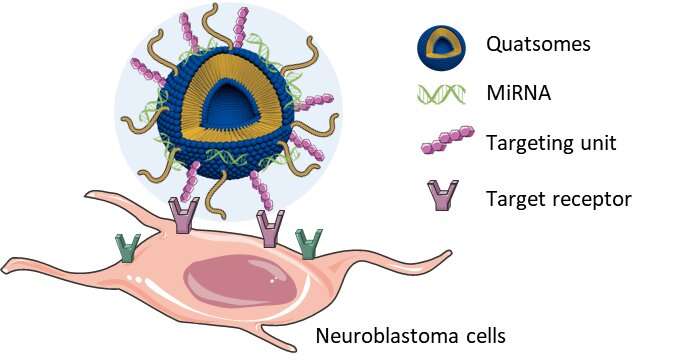Researchers at ICMAB present a study on new nanovesicles, known as quatsomes, which have been successfully engineered to encapsulate and deliver microRNAs for the treatment of tumors. These nanovesicles are produced by a simple GMP compliant process, an unavoidable requirement for the clinical use of new drug candidates. The study, published in Small, has been highlighted in the Women in Materials Science issue of Advanced Materials.
MicroRNAs (also known as miRNAs) are small RNA molecules that can interfere with the stability of other RNA molecules (specifically, messenger RNA). They have many potential therapeutic uses due to the central role they play in major diseases. However, these molecules are still infrequently used in patients due to their instability in the bloodstream and their poor ability to reach specific tissues. A potential strategy to improve the clinical delivery of miRNAs in the body is to encapsulate them in tiny carriers that compensate its current shortcomings, without side effects and offering other complementary functions.
To this end, researchers have developed and designed especially for this application nanostructures, known as quatsomes, composed by two closed lipid layers. In the new publication, the researchers present a newly engineered formulation of quatsomes that have a controlled structure, composition and pH sensitiveness.
The study is the result of an interdisciplinary team of researchers from the Institute of Materials Science of Barcelona, ICMAB-CSIC, the Vall d’Hebron Research Institute (VHIR)-UAB, the Institute for Bioengineering of Catalonia (IBEC), the Barcelona Institute of Science and Technology (BIST), the CIBER network on Bioengineering, Biomaterails and Nanomedicine (CIBER-BBN), the company Nanomol Technologies SL, the Technion-Israel Institute of Technology and the Institute for Complex Molecular Systems (ICMS).

“In this study we have collaborated with hospitals, research networks and companies. The successful results obtained illustrate the importance of collaboration across fields and beyond the academic system,” says Ventosa.
These new quatsomes can be coupled with the miRNA and injected intravenously into the body to be delivered in neuroblastoma primary tumors or in frequent sites of metastasis, such as the liver or lung, with a higher success and stability than if the miRNA were injected by itself. Once delivered, the miRNA has an effect on the cell proliferation and survival-related gens in the tumors, decreasing the tumor’s growth rate.
Many properties make quatsomes a good fit for these applications: they are less than 150 nm in size and are stable in a liquid solution for more than six months; they also have tunable pH sensitiveness, which means that different pH levels around can trigger different responses.
The production of these nanovesicles has been optimized with their final application in mind and to make sure they can be used in clinics. Through a green and scalable one-step process, named DELOS, researchers have designed a procedure that is fully compliant with Good Manufacturing Practice (GMP) guidelines stablished by the European Union. “It is time to translate our scientific findings for the benefit of patients,” says Ariadna Boloix, VHIR researcher.
In this publication, the functionality of quatsomes in delivering miRNAs is demonstrated with a specific extracranial solid tumor common in pediatric cases of cancer known as neuroblastoma, which is responsible for roughly 15 % of all pediatric cancer deaths and lacks therapies for high-risk patients. The results show that quatsomes protect the miRNA from degradation and increase its presence on liver, lung and xenografted neuroblastoma tumors, amongst other tissues.
News
New Once-a-Week Shot Promises Life-Changing Relief for Parkinson’s Patients
A once-a-week shot from Australian scientists could spare people with Parkinson’s the grind of taking pills several times a day. The tiny, biodegradable gel sits under the skin and releases steady doses of two [...]
Weekly injectable drug offers hope for Parkinson’s patients
A new weekly injectable drug could transform the lives of more than eight million people living with Parkinson's disease, potentially replacing the need for multiple daily tablets. Scientists from the University of South Australia [...]
Most Plastic in the Ocean Is Invisible—And Deadly
Nanoplastics—particles smaller than a human hair—can pass through cell walls and enter the food web. New research suggest 27 million metric tons of nanoplastics are spread across just the top layer of the North [...]
Repurposed drugs could calm the immune system’s response to nanomedicine
An international study led by researchers at the University of Colorado Anschutz Medical Campus has identified a promising strategy to enhance the safety of nanomedicines, advanced therapies often used in cancer and vaccine treatments, [...]
Nano-Enhanced Hydrogel Strategies for Cartilage Repair
A recent article in Engineering describes the development of a protein-based nanocomposite hydrogel designed to deliver two therapeutic agents—dexamethasone (Dex) and kartogenin (KGN)—to support cartilage repair. The hydrogel is engineered to modulate immune responses and promote [...]
New Cancer Drug Blocks Tumors Without Debilitating Side Effects
A new drug targets RAS-PI3Kα pathways without harmful side effects. It was developed using high-performance computing and AI. A new cancer drug candidate, developed through a collaboration between Lawrence Livermore National Laboratory (LLNL), BridgeBio Oncology [...]
Scientists Are Pretty Close to Replicating the First Thing That Ever Lived
For 400 million years, a leading hypothesis claims, Earth was an “RNA World,” meaning that life must’ve first replicated from RNA before the arrival of proteins and DNA. Unfortunately, scientists have failed to find [...]
Why ‘Peniaphobia’ Is Exploding Among Young People (And Why We Should Be Concerned)
An insidious illness is taking hold among a growing proportion of young people. Little known to the general public, peniaphobia—the fear of becoming poor—is gaining ground among teens and young adults. Discover the causes [...]
Team finds flawed data in recent study relevant to coronavirus antiviral development
The COVID pandemic illustrated how urgently we need antiviral medications capable of treating coronavirus infections. To aid this effort, researchers quickly homed in on part of SARS-CoV-2's molecular structure known as the NiRAN domain—an [...]
Drug-Coated Neural Implants Reduce Immune Rejection
Summary: A new study shows that coating neural prosthetic implants with the anti-inflammatory drug dexamethasone helps reduce the body’s immune response and scar tissue formation. This strategy enhances the long-term performance and stability of electrodes [...]
Scientists discover cancer-fighting bacteria that ‘soak up’ forever chemicals in the body
A family of healthy bacteria may help 'soak up' toxic forever chemicals in the body, warding off their cancerous effects. Forever chemicals, also known as PFAS (per- and polyfluoroalkyl substances), are toxic chemicals that [...]
Johns Hopkins Researchers Uncover a New Way To Kill Cancer Cells
A new study reveals that blocking ribosomal RNA production rewires cancer cell behavior and could help treat genetically unstable tumors. Researchers at the Johns Hopkins Kimmel Cancer Center and the Department of Radiation Oncology and Molecular [...]
AI matches doctors in mapping lung tumors for radiation therapy
In radiation therapy, precision can save lives. Oncologists must carefully map the size and location of a tumor before delivering high-dose radiation to destroy cancer cells while sparing healthy tissue. But this process, called [...]
Scientists Finally “See” Key Protein That Controls Inflammation
Researchers used advanced microscopy to uncover important protein structures. For the first time, two important protein structures in the human body are being visualized, thanks in part to cutting-edge technology at the University of [...]
AI tool detects 9 types of dementia from a single brain scan
Mayo Clinic researchers have developed a new artificial intelligence (AI) tool that helps clinicians identify brain activity patterns linked to nine types of dementia, including Alzheimer's disease, using a single, widely available scan—a transformative [...]
Is plastic packaging putting more than just food on your plate?
New research reveals that common food packaging and utensils can shed microscopic plastics into our food, prompting urgent calls for stricter testing and updated regulations to protect public health. Beyond microplastics: The analysis intentionally [...]





















